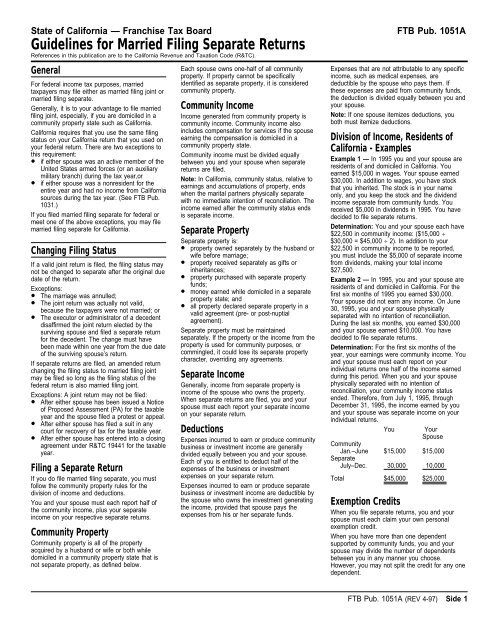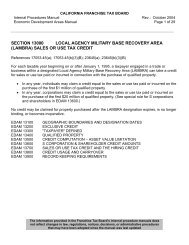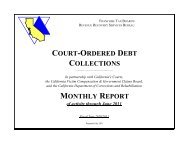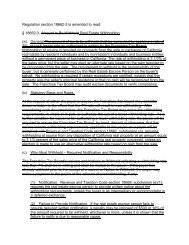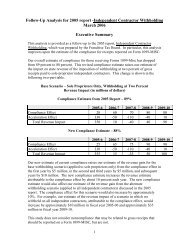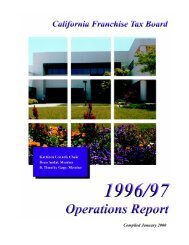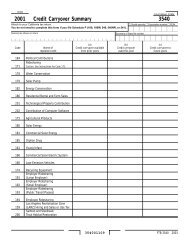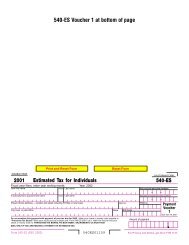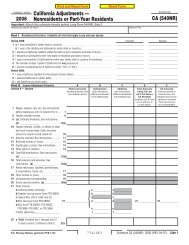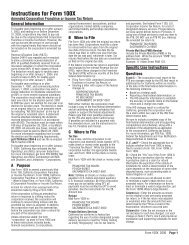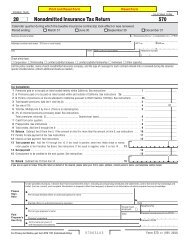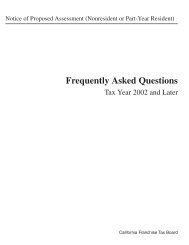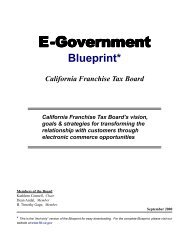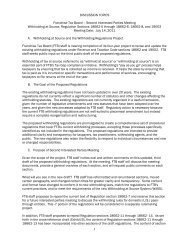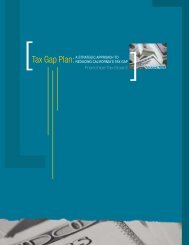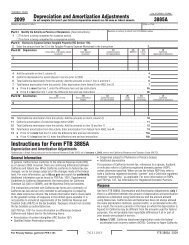Guidelines for Married Filing Separate Returns - California ...
Guidelines for Married Filing Separate Returns - California ...
Guidelines for Married Filing Separate Returns - California ...
Create successful ePaper yourself
Turn your PDF publications into a flip-book with our unique Google optimized e-Paper software.
State of Cali<strong>for</strong>nia — Franchise Tax Board FTB Pub. 1051A<br />
<strong>Guidelines</strong> <strong>for</strong> <strong>Married</strong> <strong>Filing</strong> <strong>Separate</strong> <strong>Returns</strong><br />
References in this publication are to the Cali<strong>for</strong>nia Revenue and Taxation Code (R&TC).<br />
General<br />
For federal income tax purposes, married<br />
taxpayers may file either as married filing joint or<br />
married filing separate.<br />
Generally, it is to your advantage to file married<br />
filing joint, especially, if you are domiciled in a<br />
community property state such as Cali<strong>for</strong>nia.<br />
Cali<strong>for</strong>nia requires that you use the same filing<br />
status on your Cali<strong>for</strong>nia return that you used on<br />
your federal return. There are two exceptions to<br />
this requirement:<br />
• if either spouse was an active member of the<br />
United States armed <strong>for</strong>ces (or an auxiliary<br />
military branch) during the tax year,or<br />
• if either spouse was a nonresident <strong>for</strong> the<br />
entire year and had no income from Cali<strong>for</strong>nia<br />
sources during the tax year. (See FTB Pub.<br />
1031.)<br />
If you filed married filing separate <strong>for</strong> federal or<br />
meet one of the above exceptions, you may file<br />
married filing separate <strong>for</strong> Cali<strong>for</strong>nia.<br />
Changing <strong>Filing</strong> Status<br />
If a valid joint return is filed, the filing status may<br />
not be changed to separate after the original due<br />
date of the return.<br />
Exceptions:<br />
• The marriage was annulled;<br />
• The joint return was actually not valid,<br />
because the taxpayers were not married; or<br />
• The executor or administrator of a decedent<br />
disaffirmed the joint return elected by the<br />
surviving spouse and filed a separate return<br />
<strong>for</strong> the decedent. The change must have<br />
been made within one year from the due date<br />
of the surviving spouse’s return.<br />
If separate returns are filed, an amended return<br />
changing the filing status to married filing joint<br />
may be filed so long as the filing status of the<br />
federal return is also married filing joint.<br />
Exceptions: A joint return may not be filed:<br />
• After either spouse has been issued a Notice<br />
of Proposed Assessment (PA) <strong>for</strong> the taxable<br />
year and the spouse filed a protest or appeal.<br />
• After either spouse has filed a suit in any<br />
court <strong>for</strong> recovery of tax <strong>for</strong> the taxable year.<br />
• After either spouse has entered into a closing<br />
agreement under R&TC 19441 <strong>for</strong> the taxable<br />
year.<br />
<strong>Filing</strong> a <strong>Separate</strong> Return<br />
If you do file married filing separate, you must<br />
follow the community property rules <strong>for</strong> the<br />
division of income and deductions.<br />
You and your spouse must each report half of<br />
the community income, plus your separate<br />
income on your respective separate returns.<br />
Community Property<br />
Community property is all of the property<br />
acquired by a husband or wife or both while<br />
domiciled in a community property state that is<br />
not separate property, as defined below.<br />
Each spouse owns one-half of all community<br />
property. If property cannot be specifically<br />
identified as separate property, it is considered<br />
community property.<br />
Community Income<br />
Income generated from community property is<br />
community income. Community income also<br />
includes compensation <strong>for</strong> services if the spouse<br />
earning the compensation is domiciled in a<br />
community property state.<br />
Community income must be divided equally<br />
between you and your spouse when separate<br />
returns are filed.<br />
Note: In Cali<strong>for</strong>nia, community status, relative to<br />
earnings and accumulations of property, ends<br />
when the marital partners physically separate<br />
with no immediate intention of reconciliation. The<br />
income earned after the community status ends<br />
is separate income.<br />
<strong>Separate</strong> Property<br />
<strong>Separate</strong> property is:<br />
• property owned separately by the husband or<br />
wife be<strong>for</strong>e marriage;<br />
• property received separately as gifts or<br />
inheritances;<br />
• property purchased with separate property<br />
funds;<br />
• money earned while domiciled in a separate<br />
property state; and<br />
• all property declared separate property in a<br />
valid agreement (pre- or post-nuptial<br />
agreement).<br />
<strong>Separate</strong> property must be maintained<br />
separately. If the property or the income from the<br />
property is used <strong>for</strong> community purposes, or<br />
commingled, it could lose its separate property<br />
character, overriding any agreements.<br />
<strong>Separate</strong> Income<br />
Generally, income from separate property is<br />
income of the spouse who owns the property.<br />
When separate returns are filed, you and your<br />
spouse must each report your separate income<br />
on your separate return.<br />
Deductions<br />
Expenses incurred to earn or produce community<br />
business or investment income are generally<br />
divided equally between you and your spouse.<br />
Each of you is entitled to deduct half of the<br />
expenses of the business or investment<br />
expenses on your separate return.<br />
Expenses incurred to earn or produce separate<br />
business or investment income are deductible by<br />
the spouse who owns the investment generating<br />
the income, provided that spouse pays the<br />
expenses from his or her separate funds.<br />
Expenses that are not attributable to any specific<br />
income, such as medical expenses, are<br />
deductible by the spouse who pays them. If<br />
these expenses are paid from community funds,<br />
the deduction is divided equally between you and<br />
your spouse.<br />
Note: If one spouse itemizes deductions, you<br />
both must itemize deductions.<br />
Division of Income, Residents of<br />
Cali<strong>for</strong>nia - Examples<br />
Example 1 — In 1995 you and your spouse are<br />
residents of and domiciled in Cali<strong>for</strong>nia. You<br />
earned $15,000 in wages. Your spouse earned<br />
$30,000. In addition to wages, you have stock<br />
that you inherited. The stock is in your name<br />
only, and you keep the stock and the dividend<br />
income separate from community funds. You<br />
received $5,000 in dividends in 1995. You have<br />
decided to file separate returns.<br />
Determination: You and your spouse each have<br />
$22,500 in community income: ($15,000 ÷<br />
$30,000 = $45,000 ÷ 2). In addition to your<br />
$22,500 in community income to be reported,<br />
you must include the $5,000 of separate income<br />
from dividends, making your total income<br />
$27,500.<br />
Example 2 — In 1995, you and your spouse are<br />
residents of and domiciled in Cali<strong>for</strong>nia. For the<br />
first six months of 1995 you earned $30,000.<br />
Your spouse did not earn any income. On June<br />
30, 1995, you and your spouse physically<br />
separated with no intention of reconciliation.<br />
During the last six months, you earned $30,000<br />
and your spouse earned $10,000. You have<br />
decided to file separate returns.<br />
Determination: For the first six months of the<br />
year, your earnings were community income. You<br />
and your spouse must each report on your<br />
individual returns one half of the income earned<br />
during this period. When you and your spouse<br />
physically separated with no intention of<br />
reconciliation, your community income status<br />
ended. There<strong>for</strong>e, from July 1, 1995, through<br />
December 31, 1995, the income earned by you<br />
and your spouse was separate income on your<br />
individual returns.<br />
You Your<br />
Spouse<br />
Community<br />
Jan.–June $15,000 $15,000<br />
<strong>Separate</strong><br />
July–Dec. 30,000 10,000<br />
Total $45,000 $25,000<br />
Exemption Credits<br />
When you file separate returns, you and your<br />
spouse must each claim your own personal<br />
exemption credit.<br />
When you have more than one dependent<br />
supported by community funds, you and your<br />
spouse may divide the number of dependents<br />
between you in any manner you choose.<br />
However, you may not split the credit <strong>for</strong> any one<br />
dependent.<br />
FTB Pub. 1051A (REV 4-97) Side 1
Withholding and Estimated Tax<br />
Credit<br />
Taxpayers should file to claim credit <strong>for</strong> any<br />
estimated payments and withholding from the<br />
various income sources in the same manner as<br />
the income is reported.<br />
If the income is:<br />
• Community income, then one-half of the<br />
income and one-half of the withholding or<br />
estimate tax paid attributed to that one-half of<br />
the income, is reported on each spouse’s<br />
separate tax return; or<br />
• <strong>Separate</strong> income, then the income and the<br />
withholding or estimate tax paid attributed to<br />
the separate income is reported on the<br />
separate tax return of the spouse who earned<br />
the income and prepaid the tax.<br />
For Additional In<strong>for</strong>mation<br />
Regular Toll-Free Phone Service<br />
Our regular toll-free telephone service is<br />
available from 7:00 a.m. until 8:00 p.m. Monday<br />
through Friday from January 2 through April 15.<br />
After April 15, service is available Monday<br />
through Friday, between 8:00 a.m. and 5:00 p.m.<br />
From within the United<br />
States, call . . . . . . . . . 1-800-852-5711<br />
From outside the United States<br />
call (not toll-free) . . . . . . 1-916-845-6500<br />
For Hearing Impaired<br />
with TDD . . . . . . . . . . 1-800-822-6268<br />
For federal tax questions, call<br />
1-800-829-1040.<br />
Bilingual Assistance<br />
Para obtener servicio bilingüe de in<strong>for</strong>mación<br />
sobre impuestos o <strong>for</strong>mularios, llame al número<br />
de teléfono (anotado arriba) que le corresponde.<br />
Hearing Impaired<br />
Toll-free phone service is provided <strong>for</strong> the<br />
hearing impaired with a Telecommunications<br />
Device (TDD). Call 1-800-822-6268. The<br />
Franchise Tax Board will also accept calls <strong>for</strong>,<br />
and relay messages to, any Cali<strong>for</strong>nia state<br />
agency.<br />
Side 2 FTB Pub. 1051A (REV 4-97)


